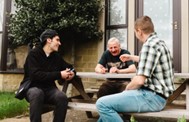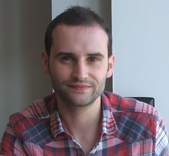
Understanding criminality in the private rented sector
Largely unregulated and unseen, the private rented sector is fertile ground for exploitation. How can police respond?
This year, a team led by University of York were awarded an £827k grant to investigate criminality in the private rented sector and co-produce solutions. In this post, Co-I Dr Xavier L’Hoiry (University of Sheffield) outlines what’s meant by criminality in the private rented sector, and how the team will contribute to developing responses to crime and victimhood in the PRS.
in the shadows

Image provided by Hope Housing
In England, a fifth of all households live in the private rented sector (PRS). While many of these households are safe places managed by landlords acting within the law, recent research in England has identified what has been called a ‘shadow’ PRS. Here, activities such as landlord fraud, letting properties not designed as residential accommodation, threatening behaviour and violent illegal eviction are commonplace.
Tenants at the very bottom end of the PRS are often vulnerable as a consequence of poverty and may well have experiences of street homelessness and/or ‘sofa surfing’ that cause and exacerbate mental health issues. The current cost of living crisis is likely to have pushed more vulnerable people into unsuitable PRS accommodation in recent months. Some of these individuals may have an uncertain migrant status and ‘no recourse to public funds’ and so are reliant on precarious housing. These same individuals may be unwilling to engage with statutory authorities when they experience victimisation, exacerbating their vulnerable positions.
In the ‘shadow’ private rented sector, “threatening behaviour and violent illegal eviction are commonplace.”
In addition, there is growing recognition that the PRS is increasingly used as a site within which organised criminals are carrying out illegal activities. As a largely unregulated and relatively under-policed space, the PRS is an ideal environment for offences such as sexual and labour trafficking.
So, this is about far more than landlords bending housing regulations to make a little more profit: criminality in the PRS is about exploitation of vulnerable tenants and by organised crime groups.
how to respond: building evidence
Beginning in April 2023, I have been part of a team led by Dr Julie Rugg (University of York) investigating how to better understand criminality and vulnerability in the context of the PRS, in a study funded by the Economic and Social Research Council.
We are working with a wide range of stakeholders including the police, local authorities and housing charities, to develop responses to crime and victimhood in the PRS. The project will investigate the extent to which these actors work together to tackle criminality and help victims.
We will also explore what happens when criminal landlords are prosecuted, and other institutions within the criminal justice system – such as the Crown Prosecution Services and HM Courts and Tribunals – become involved.
“…a new and valuable contribution to the challenge of criminality and victimhood in the PRS.”

The project will work with a wide range of stakeholders, including Hope Housing
A key ambition of our project is to capture the voices and experiences of people victimised in the PRS. While conducting research with practitioners is important, developing better understandings of how and why people’s vulnerabilities can be exploited in the context of the PRS is central to developing understandings of how criminals operate in this space. With that in mind, we have partnered with Hope Housing, a housing charity based in Bradford, to help us work with people who have been victimised in the PRS. We hope this will help develop policing and enforcement responses that are victim-centred and account for the important voice of victimised tenants.
The project is ambitious, but we hope to make a new and valuable contribution to the challenge of criminality and victimhood in the PRS. We would be interested in hearing from anyone who wishes to discuss any aspect of this project, so please get in touch at x.lhoiry@sheffield.ac.uk
Project Team
Dr Julie Rugg, University of York – Principal Investigator
Professor Georgios Antonopoulos, Northumbria University
Professor Caroline Hunter, York Law School
Dr Xavier L’Hoiry, University of Sheffield
Phil Marshall, Hope Housing, Bradford
Dr Lisa O’Malley, University of York
Dr Geoff Page, University of York
Laith Sweiss, Hope Housing, Bradford
Dr Loren Parton (University of Sheffield)
Dr Kit Colliver (University of York)
Daniella Lightower (Hope Housing)
About the Author
 Dr Xavier L’Hoiry is a Senior Lecturer in Criminology and Social Policy at the University of Sheffield. He is is the co-chair of the Sheffield University Policing Research Group (SUPRG), and an academic representative of the South Yorkshire Organised Crime Partnership Board. His research interests are predominantly on organised crime and illicit markets, with a focus on working alongside practitioners with a view towards co-producing research outputs to ensure impact and value for research end-users. He is currently engaged in several projects in the fields of policing, organised crime and surveillance, and welcomes research-related enquiries in these areas with a view to building greater partnerships with key stakeholders and research end-users, and developing future research.
Dr Xavier L’Hoiry is a Senior Lecturer in Criminology and Social Policy at the University of Sheffield. He is is the co-chair of the Sheffield University Policing Research Group (SUPRG), and an academic representative of the South Yorkshire Organised Crime Partnership Board. His research interests are predominantly on organised crime and illicit markets, with a focus on working alongside practitioners with a view towards co-producing research outputs to ensure impact and value for research end-users. He is currently engaged in several projects in the fields of policing, organised crime and surveillance, and welcomes research-related enquiries in these areas with a view to building greater partnerships with key stakeholders and research end-users, and developing future research.









0 Comments